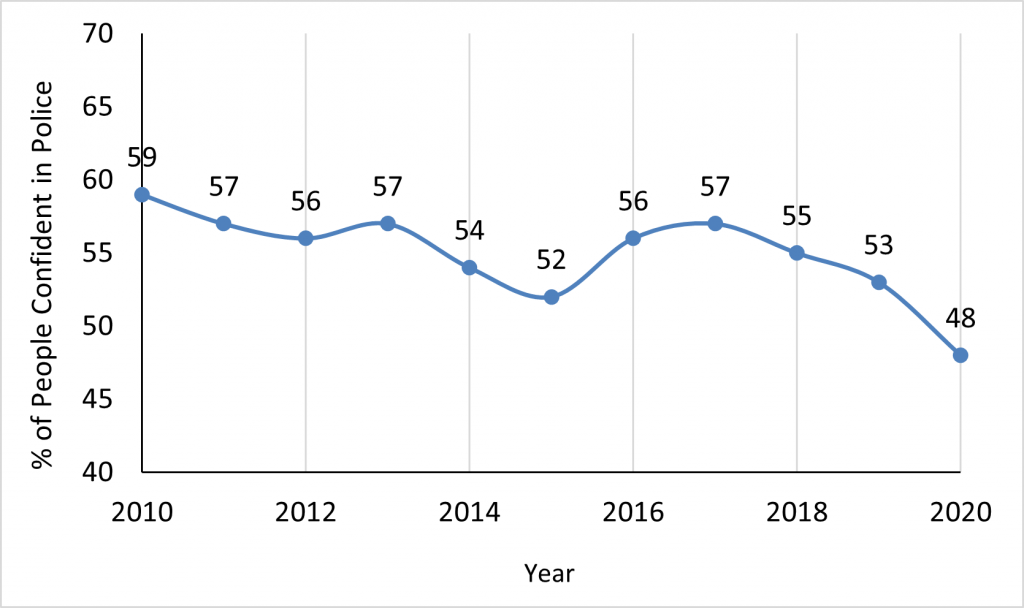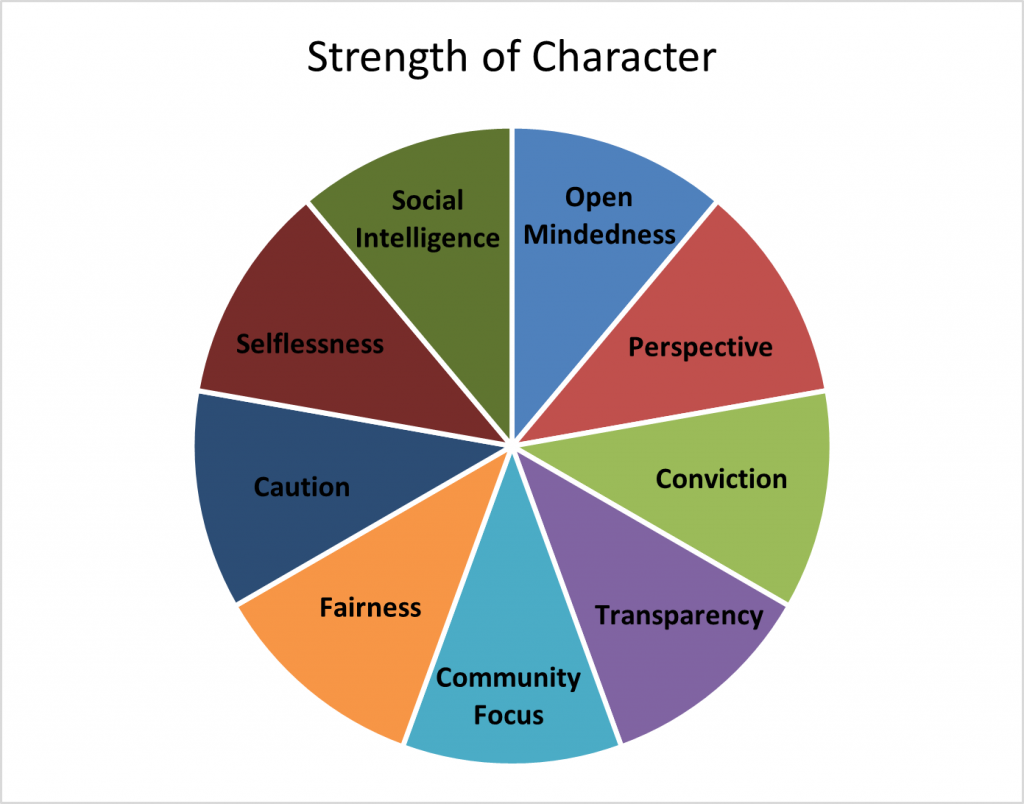What is law enforcement today? For the first time in nearly 30 years, polling shows that more than half of American adults lack confidence in the capabilities of police1 (Figure 1). This drop in confidence can likely be attributed to civil unrest resulting from the events involving George Floyd, Breonna Taylor, and other similar incidents. Additionally, media outlets tend to focus on these tragedies without acknowledging the fact that the overwhelming majority of law enforcement personnel perform in a professional and honorable manner.
Figure 1. Americans’ Confidence in the Police over the past 10 years2

Recruitment and retention of officers across the United States has reached crisis levels, with fewer people applying to departments and more people leaving the profession after only a few years on the job3. At the same time, it is more important than ever that agencies keep raising the bar and hiring the best possible candidates to serve their communities and protect the public. Though this causes a short-term challenge, continuing to raise our standards and to select the best candidates now will help departments produce better officers and secure people’s confidence in police for the foreseeable future. Facing the current challenges head on will ultimately lead to greater success for departments, and this success will attract a higher caliber of new candidates in the upcoming years.
Driving Change in Law Enforcement
At PRADCO, we partner with departments by providing them with comprehensive assessments of potential employees. We use objective data from behavioral assessments and one-on-one interviews to develop a thorough description of a candidate’s behavior and assess how well they fit within a given agency. We understand that each community demands different skills from officers, and we provide a customized assessment process that ensures each of these demands are met.
To continue providing agencies with assessments that target factors most relevant to law enforcement, we frequently revisit the needs of agencies and calibrate our employee assessments accordingly. Given the shifting demands of law enforcement, we want to ensure we help agencies address the issues they find to be most important during the selection process. To this end, we initiated an extensive set of interviews with leaders in law enforcement from a diverse set of departments to uncover the most pressing needs in their organizations.
Talking to the Experts
To determine the best ways to assist law enforcement agencies, PRADCO spoke with some of the most knowledgeable subject-matter experts in law enforcement: Police Chiefs. We interviewed Chiefs that represent in total over 1,000 officers and serve over 441,000 residents. These agencies protect people across a variety of environments, including cities, parks, hospitals, colleges, and financial institutions. Regardless of the environment, the Chiefs consistently reported several issues that could be better addressed in the hiring process, such as officers’ inability to engage the community and high emotionality when making decisions under pressure.
The Next Generation of Law Enforcement Assessments
Following the interviews, PRADCO leadership and subject-matter experts held internal discussions to best decide how to address the needs most consistently identified in these conversations. We agreed that law enforcement selection would benefit most from assessments that are more relevant to current circumstances and from developing a new assessment addressing “Strength of Character.”
To make our assessments more relevant to current circumstances, we rewrote our Law Enforcement Survey and structured interview questions and modified our assessment report to better reflect the challenges law enforcement personnel face today. Our Safety Force Assessments now go into even greater detail on how candidates behave with members of their specific community and their coworkers and how candidates’ emotions impact their decisions. Some highlights of these changes are displayed below:
| DEPARTMENTAL PRIORITY | PRADCO RESPONSE |
| Officers Must Demonstrate Respect for Citizens | Add Community Interaction as a Report Focus |
| Officers Should Be Objective | Add New Survey Items Assessing Bias and Objectivity |
| Officers Must Control Their Emotions | Expand Emotionality into a Report Focus |
| Officers Should Be Honest and Transparent | Add New Survey Items to Address Honesty/Transparency |
| Officers Must Follow Protocol and Procedure | Add New Interview Items Addressing Compliance |
| Officers Should Possess Good Character | Develop a Strength of Character Assessment |
To build on the utility and value of our reports, we have expanded our report from three categories to five. To increase the focus on an officer’s social behaviors, we now provide three categories that describe important aspects of officers’ interpersonal skills, which are detailed in the table below. Our report categories now include Sense of Duty and Work Ethic, Community Interaction, Work Relationships, Emotionality and Restraint, and Judgment and Problem Solving.
| ORIGINAL REPORT CATEGORIES | NEW REPORT CATEGORIES |
| Initiative | Sense of Duty and Work Ethic |
| Interpersonal Skills | Community Interaction, Work Relationships, Emotionality and Restraint |
| Judgment | Judgment and Problem Solving |
After reviewing the variety of interview responses and examples offered by Chiefs, the PRADCO research team found that the social factors that are most relevant to the current law enforcement environment include: social intelligence, open-mindedness, perspective, conviction, transparency, community focus, fairness, caution, and selflessness. We call the combination of these behaviors “Strength of Character.”

To ensure our assessments correctly capture each of the aspects of Strength of Character, we developed new assessment items. Items used to measure the competencies displayed in the table below are critical in the selection of new officers and the training and development of current officers.
| Strength of Character Competency | Behaviors Associated with Low Scores |
| Social Intelligence | Poor Relationship Building and Limited Insight into People |
| Open-Mindedness | Stubbornness and Rigidity |
| Perspective | Short-Sightedness |
| Conviction | Limited Courage and Acquiescence |
| Transparency | Evasiveness and Lack of Candor |
| Community Focus | Isolation from Citizens |
| Fairness | Subjectivity in Decision Making |
| Self-Discipline | Emotionality and Lack of Restraint |
| Caution | Unnecessary Risk-Taking |
| Selflessness | Selfishness and Lack of Humility |
Looking to the Future
As with any new assessment battery, PRADCO follows best practices in measuring the validity and reliability of the assessment components. We will continue our conversations with leaders in law enforcement to make sure our changes meet the needs of their agencies. We have already found positive results with implementing these changes, and we are optimistic that we will find additional relationships between our updated assessment process and critical law enforcement behaviors.
Since the environment, challenges, and needs are more critical than ever, PRADCO will continue working with agencies in enhancing their hiring processes and tapping into the most important and relevant data possible. We understand that the bar must be raised as new issues come to light and believe that through ongoing communication and research, we will continue to build the best tools to help agencies hire the best candidates to serve and protect their communities.
References

